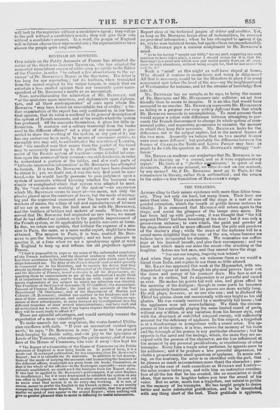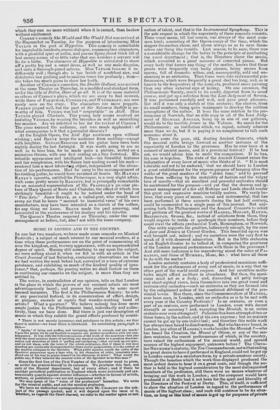THE THEATRES.
ACTORS cling to their mimic existence with more than feline tena- city. They not only die hard, but many times. Their lives are more than nine. Their existence off the stage is a sort of sus- pended animation, which the breath of public favour restores to vitality. It is rumoured that MUNDEN will return again to the stage, and revisit the glimpses of the lamps once more. He has been laid up with gout—nay, it was thought that "the fell sergeant Death" had been knocking at his door; but it was only a green-room sickness ; to cure which, the paint and powder of the stage-dresser will be more efficient than the pills and powders of the doctor's shop ; while the roars of the audience will be a sound more delightful than the roar of the sea, whose breezes we believe have invigorated his stamina. We remember our suffer- ings at his farewell benefit, and also their recompense ; and we know not which made our sides the sorest—the crushing or the laughter. Actors are but men, and they cannot leave the stage " Nor cast one longing, lingering look behind."
And when they return again, we welcome them as we would a friend from India, and rejoice to see them so little altered.
Mr. KEAN has appeared this week at the Haymarket, with un- diminished vigour of mind, though his physical powers have not the force and energy of his younger days. His face is not so sharp in its outline, but its expression is as powerful and varied as ever. He makes his points tell well also, and gives effect to the meaning of the dialogue ; though in some parts lie becomes too elaborately theatrical, and his pauses are more awfully long. He still plays, however, as no one else can ; and in Richard the Third his genius shone out occasionally with rays bright as his old glories. He was warmly received by a moderately full house ; but the applauses were not overwhelming. We think the circum- stance of his continually playing the same limited round of parts, without any addition, or any variation from his former style, and with the drawback of enfeebled corporal energy, will sufficiently account for the deficiency of applause. In this respect, a tragedian is at a disadvantage in comparison with a comic actor. The ap- pearance of the former, it is true, revives the memory of his fame and the triumph of his genius in any particular character ; but he appeals to the mind and the feelings, which, the more they are oc- cupied with the passion of the character, are the less influenced at the moment by any personal predilections, or recollections of other triumphs. Every time a tragic actor performs, he appeals anew to his audience; and if he produce a less powerful impression, he elicits a proportionably small quantum of applause. In comic act- ing, on the contrary, the actor is so identified with the part, that he pleases as much as (sometimes more than) the character; par- cularly in the case of such comedians as MUNDEN and LISTON- the actor comes before you, and with him an instinctive recollec- tion of all the fun that he has created, like an association of droll ideas, that moves to laughter before you hear the sound of his voice. But no actor, much less a tragedian, can subsist in public on the memory of his triumphs. He has taught people to desire better and more substantial gratification, and to be dissatisfied with any thing short of the best. Their gratitude is applause,
which they can no more withhold when it is earned, than bestow without excitement.
CIBBER'S comedy Site Would and She Would Not was revived at the Haymarket on Tuesday, for the purpose of introducing Miss TAYLOR in the part of Hippolita. This comedy is remarkable for improbable incidents, coarse dialogue, commonplace Characters, with a plentiful spice of oaths, and purses flying about thick till at last money seems of so little value that one wonders a servant will lie for a bribe. The character of Hippolita is calculated to show off a pretty leg and a smart dress, as well as any male disguise, and suits a.thorough-paced actress. Miss TAYLOR became it in- differently well ; though she is too lavish of confident airs, and distributes her gushing and tremulous tones too profusely ; item— she takes too much pains to show her teeth. Another of' Cm B ER'S comedies, the Double Gallant, was revived at the same Theatre on Thursday, in a modified and abridged form, under the title .of Belles, Have at .ye all. It is of the same material as others OlCienert's plays, which we are sorry to find revived, while those of FARQUHAR, CONGREVE, and WYCHERLEY, are now rarely seen on the stage. The characters are mere puppets. FARREN played well, but the part of Sir Solomon Sadlife is un- worthy of him. VINING was but " respectable" in Atall. Miss TAYLOR played Clarinda. This young lady seems resolved on imitating Vesrais, by wearing the breeches as well as mimicking her manner. Are we indebted to her for the revival of CIBBER ? The piece amused the audience, and was much applauded : of what consequence is it that a journalist dissents ? At the English Opera, the Evil Eye continues open without winking ; and REEVE keeps the audience from nodding—except With laughter. GIULIO REGONDI and his guitar have been here nightly during the last fortnight. It was worth going to see as well as to hear him, for he made quite a picture, seated on a miniature throne, with one foot resting on a tiny footstool. His infantile appearance and intelligent look—his beautiful features and fair complexion, with his flaxen hair curling round his neck— rendered him a most interesting object, independent of the attrac- tion of his performance. Had he surb, to the accompaniment of his tinkling guitar, he would have ravished all hearts. Mr. H AY NE S EAYLY'S operetta, entitled the Picturesque, is a very slight affair, with some pretty music by BARNETT, but is principally remarkable for an animated representation of Mr. FRADELLE'S popular pic- ture of Mary Queen of Scots and Chatelar, the effect of which was Strikingly beautiful—it ought to be noticed under the head of " Fine Arts." JOHN REEVE, as a ballad-poet, who would have every air that he hears " married to immortal verse" of his own may ay have been intended as a sketch of the author,. for any . thing, we know. REEVE made. the part amusing, • and luxuriated in the exuberance of his drollery and his falsetto.
The Queen's Theatre reopened on Thursday, under the same management as before, but, alas ! not with the same company.



























 Previous page
Previous page